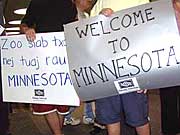| The Hmong in Minnesota |
January 28, 2005
 |
| State epidemiologist Harry Hull says the general population shouldn't be concerned about the spread of tuberculosis. (MPR file photo) |
St. Paul, Minn. — The U.S. State Department has temporarily halted the resettlement of Hmong refugees from Thailand. The delay was implemented Jan. 21, after the Centers for Disease Control found a cluster of reports of Hmong refugees who'd resettled in the United States with active cases of tuberculosis -- two cases were multiple-drug resistant TB.
In Minnesota, there's one confirmed case of tuberculosis among the newly-resettled Hmong refugees, and four suspected cases. State epidemiologist Dr. Harry Hull says it's not surprising that the Hmong from the refugee camp in Thailand could have been exposed to tuberculosis.
"We were aware that there was some TB in the camps before they left. The standard procedure is to screen people overseas for active TB before they come," Hull says. "It's a difficult disease to pick up. And sometimes people are just beginning to get sick and the tests aren't positive."
Although tuberculosis is an infectious disease, Hull says there's no reason to fear an outbreak.
"The people who are most at risk for contracting TB are people who are living in the same household with somebody who's got active TB, in the lungs, in the contagious form," Hull says. "So for the man on the street, they generally just don't have to worry about it."
Hull says the TB cases in Minnesota are being treated. He says about 11 percent of the Hmong refugees who've resettled here have tested positive for exposure to tuberculosis -- a figure he says is lower than state health officials had expected. Those cases are also being treated.




